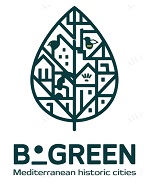B_Green aligns its outcomes with the criteria for incorporating naturalisation measures to drive in protected historical sites to more resilient transitions. It does this through major cross-cutting biodiversity and naturalisation agreements. The project seeks to propose innovative measures, co-developed by diagnostic operations in test cases and assessing the adaptation of international standards to reflect documented and on-site realities, to be implemented by local authorities in an easily replicable, and scalable way. B_Green proposes an Action Plan for Mediterranean HC‘s naturalisation and biodiversity enhancement based on indicators data collection and their parametric correlation in a digital environment. With such a model, researchers look to address singularities and commonalities at the local but also regional level. Thus, the aim is to promote transformative, strategic plans that can be scaled up or replicated at different levels and places.
Biodiversity & Green in Mediterranean Historic Cities (B_Green) proposes an interdisciplinary and integrated approach meeting the EU strategy for Biodiversity that intends to "Bring nature back into our lives", and to combat biodiversity loss through naturalisation measures in urban space. B_Green examines four Mediterranean historical settings through transparent, inclusive, multidisciplinary and reliable assessment methods that will enable the development of data-driven, innovative solutions. The main expected goals are: 1. The set up of an indicators’ framework useful to areas of special interest for action in order to improve urban biodiversity; 2. the introduction of Living Labs as a method to increase awareness on biodiversity, promote participation, shared knowledge and co-design opportunities; 3. The correlation and integration of multi-scale and multi-sector data in a 3D GIS-enabled digital platform to assess intervention scenarios and enable co-monitoring; 4. the design of smart Action Plans in four Historic Cities; 5. the set-up of tools, methodology and how-to-do guidelines for realising Biodiversity Action Plans which could be transferable and scalable to other historical cities, 6. the modelling of data integration in a 3D GIS interface for stakeholder engagement and to incorporate citizens’ sensing.
Objectives. B_Green investigates how differences in historical urban form and habitat parameters influence biodiversity, with the aim of maintaining the abundance and diversity of species of conservation concern, even in historical districts, and aims to create new proposals for renaturalization and biodiversity enhancement in HCs. The relevance and innovative aspects of these objectives and expected results rely on the data-driven, interdisciplinary approach that B_Green employs. The project aligns its outcomes with the following criteria for renaturalisation: social-cultural challenges, biodiversity and ecosystem integrity, and inclusive governance. B_Green accomplishes this through multifaceted environmental and socio-spatial accords. Proposed transversal tasks seek for innovative co-governance models with neighbours’ associations, NGOs in an environment of civil society knowledge exchange through Living Labs (LL). B_Green aims for the effective implementation of new integrated approaches and models through seminars, urban Living Labs (in line with the Call Annex D specifications) and small to medium-sized demonstrators in carefully selected cities or nearby areas to learn through the complementarity of the pilot implementation proposed by the project while demonstrating the scalable impact of the B_Green methodology in these particular settings for replication in other areas. The chosen territory is the Mediterranean, a European region with countries exposed to severe impacts of Climate Change due to more disadvantageous situations in terms of heatwaves and scarcity of water that requires adaptation. Therefore, B_Green tests these areas to promote the development of innovative adaptive solutions that can be replicated in other HCs in the near future. The consortium brings a glimpse of the representativeness that B_Green looks for with the planned local and international LL. The project counts not only on the collaboration of Cuenca, Coimbra, Naples and Strovolos municipalities but also accounts for NGOs such as BirdLife, Legambiente or Milvoz.
